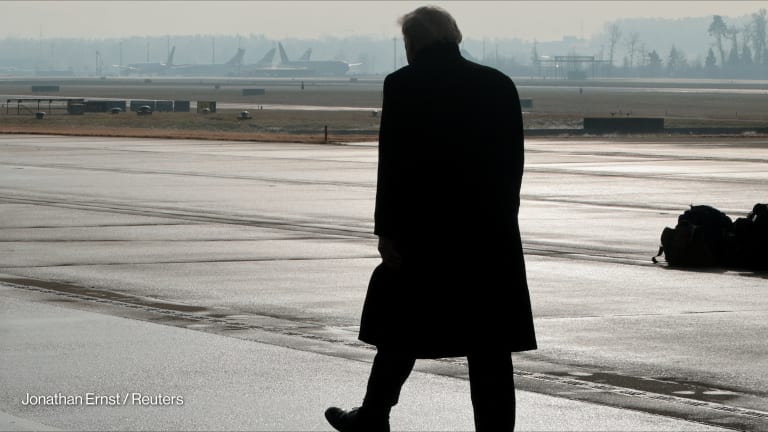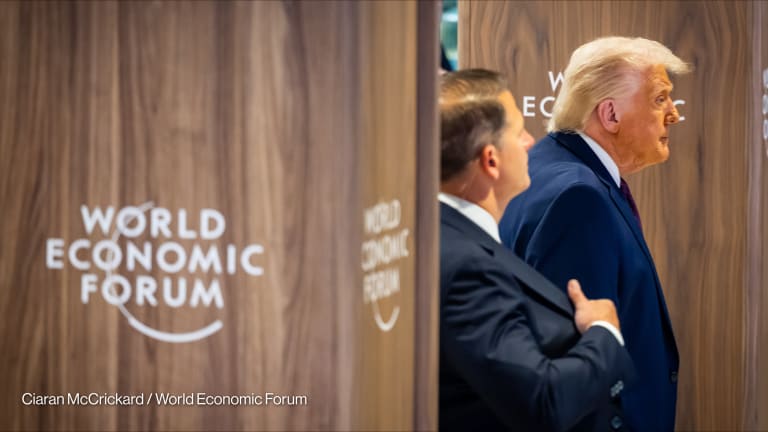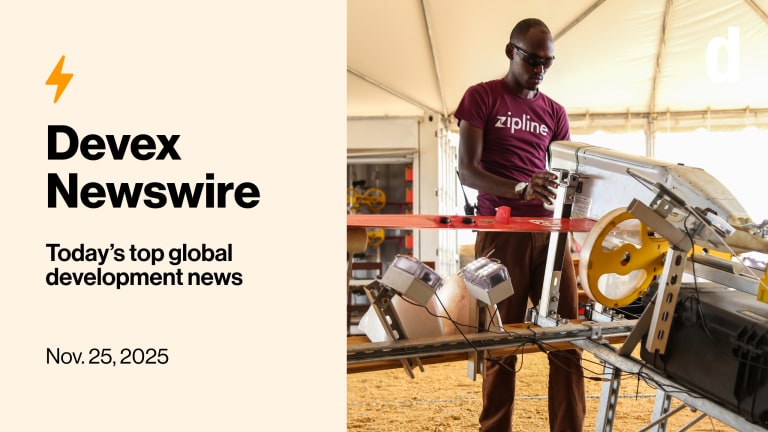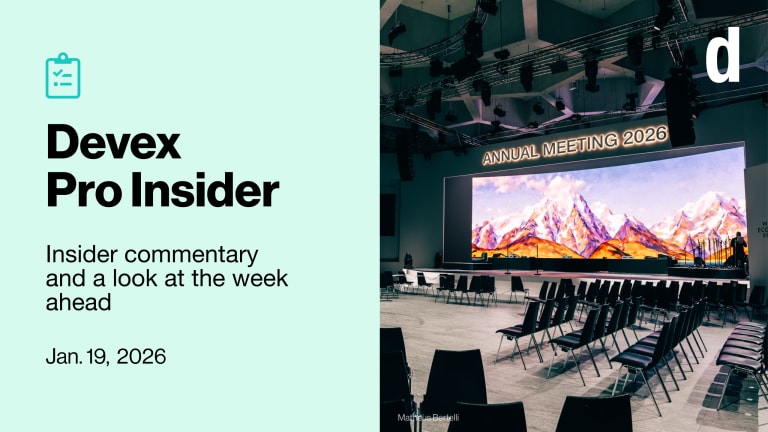
Yesterday started early — and by 7 a.m., I was halfway through a coffee at the SDG Tent.
In an effort to be friendly, I asked the person next to me how his morning was going. He looked at me, blankly, for just a moment too long.
“Well, I woke up to find out my country had withdrawn from the World Health Organization,” he said. “How are you doing?”
If I could encapsulate the last two days in Davos, that exchange would be it. It seemed like those in the development community were operating on one of two channels — with the first group trying to go about their day-to-day, and the second warding off feelings of catastrophe.
‘We’ve been here before’
On Monday night, Donald Trump’s inauguration as the president of the United States of America was streamed at watch parties across the mountain town. By the time people were getting started Tuesday morning, the returning president had paused U.S. foreign development assistance, pulled out of the Paris Climate Agreement, and withdrawn from the World Health Organization. And while many Davos attendees acknowledged those realities, many others seemed unfazed — especially when they were speaking on the record.
We overheard one group challenging themselves to find a single head of state, business leader, or high-level delegate who was willing to say anything negative about Trump — noting that activists didn’t count.
“We’ve been here before,” said Simon Stiell, executive secretary of the United Nations Framework Convention on Climate Change, at a World Economic Forum session on Tuesday. “Anyone who steps back from this significant forward momentum creates a vacuum that others will fill and will benefit from.”
Others weren’t so optimistic. European aid delegates tell me the region was in crunch time — and with Sweden’s aid budget halving, the Netherlands’ dropping by a third, and the European Commission going through a revamp, Davos’ global development cadre have their eyes trained on the private sector.
More reading:
• Trump’s foreign assistance freeze generates uncertainty and confusion.
• Trump orders U.S. exit from the World Health Organization. Can it survive the financial hit? (Pro)
• Paris Agreement in peril as Trump reenters White House
• A look back at European aid’s slash-and-burn year (Pro)
+ Join our discussion today at 12:30 p.m. ET (6:30 p.m. CET) to analyze the impact of Trump’s decision on multilateral partnerships and global development and what more to come in his first 100 days.
This event is exclusively for Devex Pro members. If you aren’t one yet, you can start a 15-day free trial now to register for the event. Check out all the exclusive offerings available to you.
B as in billion!?
$2 billion
—That’s the latest ask from the Global Fund to Fight AIDS, Tuberculosis and Malaria — all of which the organization hopes will come from the private sector.
The sum was announced by Global Fund Executive Director Peter Sands at a cozy cocktail party on Tuesday night. The appeal was met with more than a few raised eyebrows, and a whisper to my right that sounded something like: “With a b?”
But when I caught Sands later on, he held firm — both on the magnitude of the ask, and the reasons behind it.
“This is a moment of reckoning for the fight against these three diseases, and we need the private sector to step up,” he told me.
Got a problem? Get a fund
Speaking of funds, we have a few more for you. The U.N. is floating a new ocean mega-fund, one that would skim a small fee from the massive flow of ships and data cables crossing the high seas. Peter Thomson, the U.N. ocean envoy, hopes the idea can generate billions in sustainable funding.
“Just clipping a little bit of that ticket ends up with billions in every calculation,” Thomson told our president and editor-in-chief, Raj Kumar, on Monday.
Thomson’s not alone. The Global Fund has unveiled a $50 million climate and health fund, one that aims to target the world’s most climate-vulnerable nations. In partnership with the Gates Foundation and Sanofi, the fund will help countries tackle the health impacts of climate change, delivering a “focused stream of finance” to nations most at risk.
+ For more insider reporting on global health, sign up for Devex CheckUp, a free, weekly newsletter.
Shade on aid
It’s not just organizations that are looking for private sector cash. Somalian President Hassan Sheikh Mohamud used Davos to make a case for investment in his country.
“Aid is not the solution for Somalia today,” Mohamud told me on Tuesday. “Yes, it’s still important for saving lives. But creating an opportunity where people can help themselves, and save their lives themselves … and have food security sovereignty is very important. That’s where we are focusing right now.”
I caught him right after he told a crowd that Somalia was changing. Despite its continued challenges, Mohamud felt the nation was ripe for economic investment — especially when it came to food and agriculture.
“Over the last two years, we’ve made a lot of progress and improvement,” said Mohamud, speaking at a WEF panel. “Now, Somalia is a normal country that’s playing a major role in regional economic integration of the whole of Africa.”
Today, the country has a GDP of $11.9 billion, up from $9.2 billion in 2020 and $6.9 billion in 2015. But even so, one-third of the Somali population is still in need of humanitarian assistance, and 3.5 million are internally displaced.
Gaza spot-check
Speaking of humanitarian assistance, where are we on Gaza? The first phase of a three-step humanitarian ceasefire went into effect on Sunday, halting a war that’s killed 1,200 Israelis and more than 46,000 Palestinians over the last 15 months.
“The key priority for us, on the humanitarian side now, is to get a huge surge of aid into Gaza,” said Tom Fletcher, the U.N. under-secretary-general for humanitarian affairs and emergency relief coordinator, at a Davos session. “For us at the U.N. system, it’s a real test.”
Over the past few days, more than 1,500 aid trucks have made their way into Gaza, Fletcher said. Still, he stressed that the U.N. can’t do it alone.
“Gaza has been a laboratory of war, testing new weapons” he added. “We now need it to be a laboratory of humanitarian support. Can we use as much ingenuity and innovation in saving lives as in killing people?”
Workforce math
That’s Amy Pope’s take on Trump’s plans to deport all of the United States’ undocumented immigrants — a group that’s estimated to count up to 11 million people.
“It is clear that American industry has been relying on migrants — high-skilled, low-skilled, irregular, regular — across the board,” says Pope, who serves as the director-general of the International Organization for Migration. “If you start to pull out that workforce, if you do not have another workforce ready to go in, you’re going to see the impact across the board,” she adds.
Pope was speaking to Raj on a special episode of our This Week in Global Development podcast, where they both were tuning in from Davos. And while Pope said the logistical capacity may not exist, the economic toll certainly does.
“In the United States, where you’re talking over 11 million people who’ve been living and working there, frankly — and I know this because I worked at a time when more than 400,000 people were removed in a year under President Obama — the system cannot bear removing 11 million people.”
Listen to the full conversation: IOM chief talks about the realities of migration and deportation
Drink up
Tim Wainwright, the CEO of WaterAid UK, is trying a different tack. While he’s at Davos, Wainwright is pushing the world’s elite to focus on the costs of inaction — and how by 2050, water scarcity could see high-income countries’ GDP shrink by 8%.
Low-income countries could fare even worse, with a potential fall in GDP of up to 15%.
“It’s no exaggeration to say there is a major water crisis in the world,” says Wainwright, speaking over coffee at the SDG Tent. “And with the increasing occurrence of extreme weather events, it’s like watching a slow onset humanitarian disaster that’s affecting the whole world.”
Last year, WaterAid found that infections acquired in health care facilities cost sub-Saharan Africa $8.4 billion a year — half of which could have been prevented by improved water, sanitation, and hygiene. Across Ethiopia, Ghana, Malawi, Mali, Nigeria, Uganda, and Zambia, that amounted to 1.1% of these countries’ GDP, and 4.5% of their total health budgets every year.
“Spend the money now, and save a lot of money later,” Wainwright says.
Room for one more?
In the meantime, Yusuf Tuggar, Nigeria’s minister of foreign affairs, was looking for a different type of influence. He used the Davos stage to push for an invite to the Group of 20 largest and emerging economies, which is something Nigeria has long had its eyes on.
Late last year, South Africa — which holds the current G20 presidency, and the only African nation with a G20 seat — signaled support for Nigeria’s bid. If included in the bloc, Tuggar said Nigeria would push South Africa’s aims forward, from the advancement of special drawing rights to the push for a global tax standard. ICYMI, the G20 agreed to tax the superrich last November.
“It doesn’t suffice to say, ‘Well, Africa is already represented by the African Union, and then you have South Africa, so Nigeria doesn’t really need to belong,’” he adds. “We have to get beyond this approach to Africa as if it’s one country.”
ICYMI: What will the first African G20 presidency look like? (Pro)
+ For more insider brief on development finance, sign up for Devex Invested, our free newsletter on business, finance, and the SDGs.
Prime location
That being said, not everyone at Davos was trying to curry favor with the elite. The Amazon House was splattered with green and orange paint on Monday, creating the perfect backdrop for activists posing for photos.
They held up a sign that said “DROP Fossil Subsidies” on the same day Amazon’s founder, Jeff Bezos, stood at Trump’s inauguration. The storefront was sparkling clean a few hours later, but the paint made quite a splash.
Spotted
At the Mooch’s annual wine party: Dante Disparte and Mercina Tillemann Perez of Circle, Michael Froman of the Council on Foreign Relations, Judee Ann Williams and Christine Lancman of Creative Artists Agency, Alan Fleischmann of Laurel Strategies, Ian Bremmer of Eurasia Group, and Candace Kelly of Stellar Development Foundation.
At the Schatzlap: A Pakistani delegation wearing a green blazer-green hat combo, all of whom began their mountain-top event by singing Pakistan’s national anthem.
Outside the Congress Center: A stream of white-badge delegates — some of the highest-level Davos attendees — eating freshly made waffles topped with piles of whipped cream. Thanks to WEF for the afternoon snack!
Inside the Congress Center: Fashion designer Diane von Furstenberg listening to an interview between South African President Cyril Ramaphosa and WEF Executive Chairman Klaus Schwab.
On the promenade: A humanoid robot, walking toward all the action.
Sign up to Newswire for an inside look at the biggest stories in global development.








